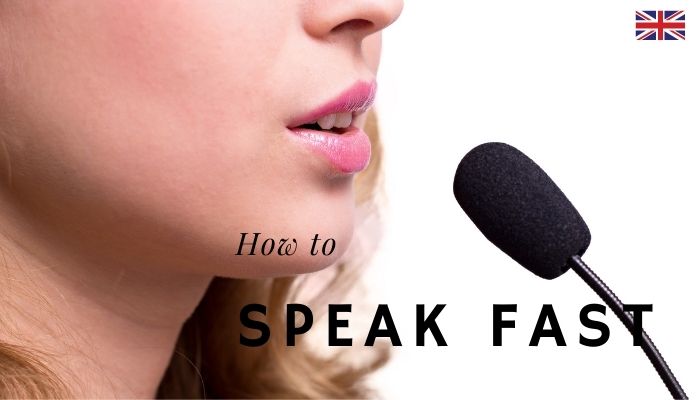Great site to keep my english skills updated for work and travel. I am really enjoying the lessons!
Maria C
 Argentina
Argentina


Muitos alunos de inglês percebem que os falantes nativos de inglês tendem a falar rápido, então pensam que falar mais rápido ajudará seu inglês a soar mais fluente. Mas você tem que ter cuidado - pode ser perigoso tentar falar inglês muito rápido se você não seguir essas dicas.
Por quê? Bem, existem duas razões. Em primeiro lugar, se a sua pronúncia não estiver clara, falar mais rápido só vai piorar as coisas - e as outras pessoas não vão entender você.
E em segundo lugar, falar especialmente rápido às vezes pode dar a impressão de que você está nervoso ou inseguro, que não está confiante. Esta dica se aplica a falantes nativos de inglês também - quando alguém está falando a mil por hora (o que significa muito rápido), isso pode fazer com que pareça que está nervoso ou desconfortável, ou não pensando realmente no que está dizendo. Então, como eu disse, tome cuidado para não exagerar (não faça muito) ao aumentar sua velocidade de fala.
Aprenda como melhorar sua fluência em inglês e como falar inglês mais rápido com contrações informais comuns em inglês.
Por exemplo:
• What are you going to do?
• Whatcha going to do?
• Whatcha gonna do?
ou
• Do you want a beer?
• Do you wanna beer?
• D’you wanna beer?
• D’ya wanna beer?
• Ya wanna beer?
• Wanna beer?
CONTRACÇÕES INFORMAIS COMUNS PARA SOAREM COMO UM NATIVO
Contrações informais são quando combinamos duas ou mais palavras de alta frequência para torná-las mais rápidas e mais fáceis de dizer. Falantes nativos fazem isso automaticamente. Estamos acostumados a enfatizar palavras importantes e reduzir as que não importam.
1. Ain’t = Am not/are not/is not
E.g. She ain’t hungry.
2. Ain’t = Has not/have not
E.g. He ain’t done it yet.
3. Wanna = Want to
E.g. I wanna go home.
4. Wanna = Want a
E.g. I wanna coffee.
5. Whatcha = What have you
E.g. Whatcha got there?
6. Kinda = Kind of
E.g. Anna’s kinda cute.
7. Sorta = Sort of
E.g. She’s sorta tired.
8. Outta = Out of
E.g. I’m outta money.
9. Alotta = A lot of
E.g. I eat alotta chocolate.
10. Lotsa = Lots of
E.g. He has lotsa money.
11. Mucha = Much of
E.g. It’s not mucha a surprise, is it?
12. Cuppa = Cup of
E.g. Would you like a cuppa tea?
13. Dunno = Don’t know
E.g. I dunno.
14. Lemme = Let me
E.g. Lemme see!
15. Gimme = Give me
E.g. Gimme the book!
16. Tell’em = Tell them
E.g. We should tell’em the truth.
17. Cos = Because
E.g. I cry cos I’m in pain.
18. Innit? = Isn’t it?
E.g. It’s blue, innit?
19. I’mma = I’m going to
E.g. I’mma talk to my mother.
20. Gonna = Going to
E.g. I’m gonna tell you the truth.
21. Needa = Need to
E.g. You needa know about Jame.
22. Oughta = Ought to
E.g. You oughta phone your brother.
23. Hafta = Have to
E.g. We hafta go.
24. Hasta = Has to
E.g. John hasta work today.
25. Usta = Used to
E.g. She usta live in France.
26. Supposta = Supposed to
E.g. I’m supposta start a new job on Monday.
27. Cmon = Come on
E.g. Cmon, let’s do it together!
28. Ya = You/ you are
E.g. I miss ya.
29. Gotta = (have) got a
E.g. Have you gotta phone?
30. Shoulda = Should have
E.g. She shoulda called yesterday.
31. Shouldna = Shouldn’t have
E.g. I’m sorry, I shouldna told you that.
32. Wouldna = Wouldn’t have
E.g. I wouldna done that if I were you.
33. She’da = She would have
E.g. She’da been prepared for class.
34. Coulda = Could have
E.g. He coulda been here by 5:00.
35. Woulda = Would have
E.g. He woulda arrived soon.
36. Mighta = Might have
E.g. You mighta left the book at the airport.
37. Mightna = Mightn’t have
E.g. She mightna caught her train.
38. Musta = Must have
E.g. She musta been in a hurry.
39. Mussna = Must not have
E.g. You mussna stolen the money.
40. Dontcha = Don’t you
E.g. Dontcha see it?
41. Wontcha = Won’t you
E.g. Wontcha watch this film?
42. Whatcha = What are you
E.g. Whatcha doing?
43. Betcha = Bet you
E.g. Betcha can’t guess who she is!
44. Gotcha = Got you
E.g. We gotcha!
45. D’you = Do you
E.g. D’you like him?
46. Didntcha = Didn’t you
E.g. Didntcha like this book?
47. S’more = Some more
E.g. I will need s’more time.
Depois de ler este artigo, espero que você se sinta muito mais confiante para entender e, eventualmente, usar essas contrações informais.
Verifique sua pontuação - Experimente nosso Quiz de inglês grátis + receba um bônus grátis